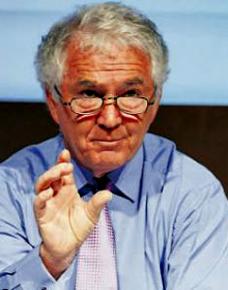The banks that bankrupted Ireland
Brian Cowen, the Republic of Ireland's prime minister, announced plans to step down in a few months' time, opening the way for new elections early next year. Cowen's resignation was the latest episode of Ireland's economic and political crisis, brought on by a disastrous crash of the country's banks and a bailout that has put the government on the brink of default. Ireland has followed the same trajectory as the U.S.--a period of wild expansion during the 2000s and before, based in large part on financial speculation and manipulation and a real estate boom that set the stage for the crash to come.
, an Irish socialist and columnist for the Belfast Telegraph in Northern Ireland, a part of the UK, looks at some of the factors that gave rise to the crisis in the South--and how anger at the bankers and their politician friends is finding a new level of expression.
THAT'S IT then. The Republic is going down the tubes. Not to be wondered at, I suppose, when tubes have been running the place for years.
There was a march in mid-November on the Bray in County Wicklow, south of Dublin--on the home of top tube Seanie Fitzpatrick. It was a sedate affair by all accounts, muted chanting and a gathering by the wrought iron gates which lasted a mere three minutes.
Seanie is the fellow who was hail-fellow-well-met with Dublin's political elite while he presided over the basket-case bank Anglo Irish, throwing billions to his pals in the property business on the apparent assumption that the aforementioned pals would bail him out if the bank went belly-up.
Even when the light-touch regulator became aware that Seanie was switching vast sums of money back and forth to conceal the true state of the bank's balance sheet from investors, the regulator and politicians in the know averted their gaze.
Seanie was one of the airbrushed poster boys for the Celtic Tiger--a mangy moggie now, maybe, but top cat of European capitalism then.

I am of two minds about marching on a private home. After all, Seanie's spouse, Catriona, can hardly be blamed for dodgy dealings she wasn't involved in...except that, now that I come to think on it, Catriona will be worth more than $4 million after the carve-up of Seanie's assets, and is entitled to half of her husband's $4.6 million pension pot.
Nothing illegal in that, of course--unlike misrepresentation to the market of the state of a company's balance sheet.
One law works, the other doesn't. So far, anyway. And the same is true of the entity which includes our own little jurisdiction.
It is also true of both jurisdictions that the notion that there isn't a wing of spare wealth left in the land is so far from the truth as to be well out of sight. Which is where the masters of finance desperately want it to stay.
According to the Irish Central Bank's quarterly bulletin, Irish wealth inclusive of property came to almost $900 billion in 2006--around $220,000 per person. This has now fallen by about 30 percent, mainly due to the property crash. But there is no reason to believe that the gap in distribution has narrowed in the interim, and some reason to believe it has widened.
All the indications are, then, that the Irish figure for personal wealth remains significantly higher than the equivalent figures for France or Germany.
There is no foundation for the suggestion that there's little scope for a hefty hike in taxes on the rich to help close the deficit. Things are much the same in this neck of the woods.
I SEE from the papers that Her Majesty's tax collectors are still trying to rubbish a story about Vodaphone--the world's largest mobile telecommunications company, headquartered in Britain--mentioned here in the Belfast Telegraph a few weeks back.
It is not denied that Britain's top tax official, David Hartnett, personally supervised a deal reducing the Vodaphone's $11 billion tax liability to about $1.5 billion: nearly $10 billion saved by the company, lost to the Treasury.
The man Hartnett negotiated the deal with was Vodaphone's executive in charge of tax issues, John Connors, whose previous job, coincidentally, had been as a senior official working directly under Hartnett at Her Majesty's Revenue and Customs. Marvelous. Hartnett maintains, and Tory spokespersons confirm, that there is nothing illegal in this.
Against this background, can anyone think of a good reason the rest of us shouldn't fiddle our tax returns? Or a person on benefits earn a bit on the side without telling social security?
It would be wrong, and probably illegal, to advocate such a course. But could we really blame anyone who risks the law for a few quid extra?
A writer in the British Observer newspaper reminded us of one of the best-known figures of the 1980s, New York socialite Leona Helmsley, who was thrown into the slammer in 1989 by a state court for tax evasion after an angry maid quoted her to the authorities saying: "You must pay a lot of taxes. We don't pay taxes. Only the little people pay taxes."
It is possible that the little people are about to stand up. More marches on the mansions of the banking bosses. More pickets on tax-avoiding outfits like Vodaphone. More occupations of the offices of the parties out to drain the relatively poor, while filling the coffers of the absolutely rich.
As a senior Metropolitan Police officer observed of the student demonstration in London last week: "The way things are in the country, we can expect more of this."
You betcha.
First published in the Belfast Telegraph.


